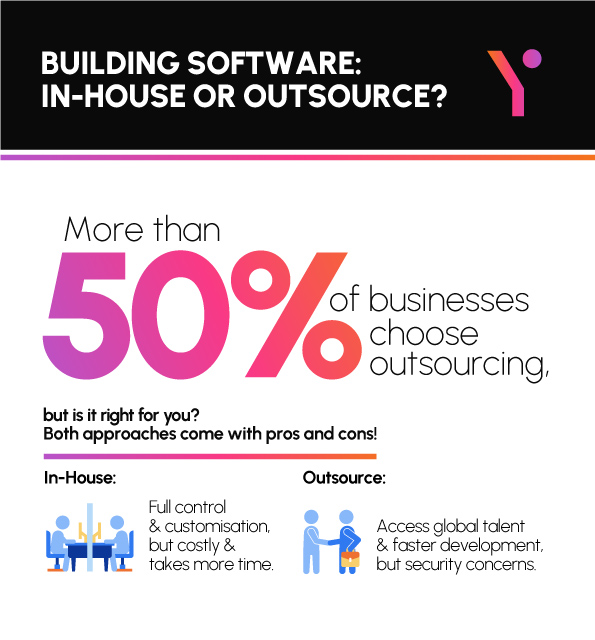Build software your way or embrace the outsourcing model? In a nutshell, in-house development offers control and customisation, but outsourcing is the modern norm. Weigh the pros, cons, and future trends to decide what’s right for your business. Read on for a deep understanding into the in-house vs. outsource software development debate!
Every business faces a pivotal decision when it comes to software development – the choice between building an in-house team or outsourcing to external developers. Well, the decision you make here will have far-reaching effects on your business operations.
In this article, we’ll break down the pros and cons of in house software development and discuss why modern businesses prefer outsourcing rather than building an in-house team, providing you with the insights you need to make an informed decision for your business.
What is In-House Development?
The term “in-house software development” describes a process where a company’s own employees create, test, and support software solutions.
Unlike outsourcing, where external vendors handle the development process, in-house development empowers organisations to have complete control and ownership over their software projects.
In-House vs. Outsourcing Weighing the Options
The software development industry is teeming with thousands of developers worldwide. Companies today have the flexibility to hire developers onshore or offshore, adding an extra layer of complexity to the decision-making process. Many businesses are opting to shift away from maintaining an in-house team and instead turn to outsourcing for reasons ranging from expertise and productivity to convenience and cost-effectiveness.
The Catch: A Critical Decision
However, the decision to outsource or build an in-house team isn’t one to be taken lightly. It holds the power to shape your business trajectory significantly. The allure of expertise and cost savings must be weighed against the potential drawbacks and long-term implications. So, what can you anticipate when building a team of developers in-house or opting for outsourcing? Let’s dive into the key considerations.

In-House vs Outsource Software Development
Before examining the pros and cons of in house software development, it’s necessary to differentiate between in-house and outsourced software development. In-house development involves employing internal resources, such as a dedicated team of developers and project managers, to create custom software solutions customised to the specific needs of the business. On the flip side, outsourced development involves hiring other companies or freelancers to handle various stages of the software development life cycle.
Pros of In-House Software Development
Alright, let’s talk about the bright side of the in-house software development. Having an in-house development team is about holding the reins in your hands. Here are some key perks that might just make you lean towards building your own team.
Control and Flexibility
What if you have a sudden change in your project requirements, a new idea pops up, or maybe there’s a curveball in the market? With in-house development, you’re not stuck waiting for someone else to make decisions. You’re the one who will make critical and technical decisions for your project.
In-house development gives you the flexibility to adapt, tweak, and pivot without the bureaucratic delays that can come with external partnerships.
Security and Intellectual Property
Data is treated as gold these days, and protecting it is non-negotiable. When you build your software in-house, you’re the fortress guard. You get to set up the security, and you are in charge of implementing integral strategies.
Not only do you have tighter control over your data’s security, but you’re also the undisputed owner of your intellectual property. No worries about someone else claiming credit for your groundbreaking solution or sneaking a peek at your secret sauce – it’s all yours.
Teamwork and Communication
It would be ideal if your project managers, designers, and developers were all located in the same building. Need a quick clarification on a feature? Just stroll over to your developer’s desk. Want to brainstorm ideas with your designer? They’re just a coffee machine away.
In-house development fosters a team spirit that’s hard to replicate. You are not limited to emails and Zoom calls; it’s about face-to-face collaboration that sparks creativity and problem-solving.
Alignment with Business Strategy
Let’s not forget the big picture – your business strategy. In-house development allows you to integrate your software projects seamlessly with your overarching business goals. It’s a strategic asset finely tuned to boost your business objectives.
The in-house team, embedded in the core of your business, understands the nuances and intricacies like no one else. They’re credible in streamlining processes and bringing innovation at each step of the way.
In a nutshell, in-house development is about building a software team. Things might sound all sorted with an in-house team, but, as you might expect, it’s not all sunshine and rainbows. Stick around, and we’ll dive into the challenges on the flip side of this in-house development adventure.
Cons of In-House Software Development
Now, let’s talk about the cons. Yes, there are challenges, and it’s essential to be aware of them before planning to build up a team from scratch.
High Costs
First things first – the budget. In-house development can hit your wallet where it hurts. Setting up a team requires a substantial initial investment – it also demands a proper infrastructure and strategy to bring in the A-team of developers.
The financial commitment doesn’t end there. There are ongoing costs – salaries, benefits, and the myriad of expenses that come with maintaining an internal team. It’s a long-term investment that demands a careful balance between cost and value.
Talent Acquisition and Retention
Finding the right people for your in-house team is still a dream for many tech companies. The tech talent pool is vast, but so is the competition. Hiring developers is one thing, but finding the right ones who resonate with your company culture, share your vision, and can adapt to the ever-evolving tech trends is a hard job.
Retaining top talent is another challenge. Developers are hot commodities, and the grass might seem greener on the other side. Developers today require more than just a pay check; they want flexible working hours and seek remote opportunities rather than on-site full-time jobs.
Extended Development Timelines
Patience is a virtue, especially in in-house development. The pursuit of perfect candidates and alignment with internal processes can extend development timelines.
Unlike outsourcing, where external teams may prioritise speed, an in-house team may potentially delay time-to-market.
Skills and Expertise Gaps
Building a diverse in-house development team requires a skilled talent acquisition professional and a skilled hiring manager. Because you need experts in coding, design, and project management – the list goes on. The challenge is not just in finding these skills but in ensuring they complement each other seamlessly.
Skill gaps may emerge as the technology evolves faster than a speeding bullet. You will also need to ensure continuous efforts in training and upskilling, which are essential to keep your team’s powers sharp and up-to-date.
Management Overhead
With great power comes great responsibility, and with an in-house team, that responsibility rests on your shoulders. Managing an internal team introduces an additional layer of complexity – from project coordination and performance evaluations to conflict resolution and team dynamics.
More than software development, it’s about managing the human side of things. The administrative overhead can take a toll on your resources and attention.
Regular Payment Without Any Assignment
Now, let’s talk about a potential budget leak. In-house teams are on the clock, and that clock keeps ticking, regardless of the workload. Unlike outsourcing, where you pay for the tasks completed, an in-house team draws a salary regardless of the immediate workload.
This can lead to financial inefficiencies, especially during slower periods when the team might not be fully dedicated towards any task.
Leading A Team Could Be Expensive and Tough
Things get out of control when your business eventually gets a boom, and you need to scale up your development team. It takes time, effort, and, of course, money. Hiring new members, setting up workstations, and integrating them into the existing team is a gradual process.
Comparatively, when we talk about outsourcing, where scaling can be relatively swift and flexible, in-house scaling demands a more measured approach.
In short, the cons of in-house software development are real, but so are the solutions and strategies to navigate them. It’s about understanding the challenges and finding the right balance. And in the end, everything depends on specific requirements and personal preferences.
Benefits of Outsourcing Software Development
Now that you have an understanding of the pros and cons of in house software development, let’s discuss the benefits of outsourcing software development a bit. More than a convenience, it could be a strategic advantage to outsource software development to reshape your business dynamics.
Saves Time and Resources
Outsourcing is the new norm in the software industry – It can drastically reduce time and efforts. It’s a time-saving magic trick that allows you to leapfrog the lengthy process of building an in-house team.
External teams are pre-assembled and armed with the necessary skills and expertise. Your project kicks off without the time-consuming tasks of talent acquisition and team setup. It’s not just a time-saver; it’s an accelerator for your software development journey.
Off-the-Shelf Solutions
When you outsource, you have access to pre-made solutions that are customised to your needs, which saves you time, energy, and crucial technical procedures while still delivering correct results. When working with outside companies, it’s common to tap into their extensive knowledge as well as their library of pre-built modules and frameworks.
This off-the-shelf advantage can significantly speed up development timelines, ensuring that your project hits the ground running. It’s not just about getting it fast; it’s about getting it right from the start.
No Struggle to Find the Right Candidate
Finding the right person for a job can be very challenging. However, outsourcing can help eliminate this problem. You don’t have to go through the tedious process of reviewing CVs, conducting countless interviews, and worrying about cultural fit. Outsourcing provides you with a team that has already been pre-screened for their skills and experience.
This freedom from the hiring hustle allows you to focus on what you do best – your business. Let the experts handle the code while you steer the ship.
Downsize Smartly Without Leaving a Vacuum
What if your project is complete, and you don’t need a full-fledged in-house team anymore? In that scenario, outsourcing allows you to downsize without the headaches. You’re not left with a void of unutilised talent and overhead costs.
Scaling down becomes a strategic move rather than a logistical puzzle. It’s the flexibility to adjust your team size based on project demands without the burden of managing a surplus workforce.
Don’t Have to Worry About Technicalities
The intricacies of technology are ever-evolving, and keeping up can feel like a marathon. Outsourcing puts the responsibility of staying technologically relevant on the shoulders of the external team. They live and breathe the latest tech trends, ensuring that your project is always on the cutting edge.
You don’t have to worry about updating your team’s skill set or investing in the latest tools. It’s like having a tech-savvy ally always ready to bring the newest tricks to the table.
Ease the Burden on Your In-House Team
Your in-house team is like the backbone of your business, handling the core operations. Meanwhile, outsourcing allows you to relieve them of the additional burden of software development. Having an in-house operational team and outsourcing software development could make a good combo.
This dynamic division of labour ensures that each component of your business operates at peak efficiency. Your in-house team can breathe, knowing that the software side is in capable hands.
In essence, outsourcing provides a strategic edge that aligns with your business goals. It’s a partnership that offers speed, flexibility, and expertise without the intricacies of building and managing an in-house team.
Pros and Cons of in house Software Development – At a Glance
| Pros | Cons | |
| Control and Flexibility | – Adaptability to changing requirements | – Higher initial costs |
| Security and Intellectual Property | – Complete control over data security | – Extended development timelines |
| Teamwork and Communication | – Seamless collaboration within the team | – Talent acquisition and retention challenges |
| Alignment with Business Strategy | – Integration with overall business goals | – Skill and expertise gaps |
| High Initial Costs | – Investment in infrastructure and skilled personnel | – Extended development timelines |
| Extended Development Timelines | – Balancing thorough development with timely delivery | – Management overhead |
| Skills and Expertise Gaps | – Continuous efforts in training and upskilling | – Regular payment without any task |
| Maintenance Challenges | – Ongoing responsibility for updates and bug fixes | – Scaling your team will be expensive and slow |
| Internal Resource Strain | – Strain on other business functions |
Final Thoughts on the Future of In-House Software Development for Businesses
The future of in-house software development holds both challenges and opportunities for businesses. While in-house development offers unparalleled control and alignment with business strategy, the increasing complexity of technology and the demands for specialised skills pose significant hurdles.
As businesses plan ahead, the key lies in strategic decisions. Striking the right balance between pros and cons of in house software development will likely emerge as a winning strategy.
Additionally, emerging tech, low-code platforms, and AI will play a pivotal role in reshaping software development. If you plan to outsource software development, consider a reliable application development company that leaves no stone unturned to provide agility in your software development lifecycle.
Ultimately, businesses must remain agile, adapt to technological advancements, and choose development strategies that align seamlessly with their unique needs and goals. The journey ahead is dynamic, and the success of in-house software development will be intricately tied to a company’s ability to navigate these changes effectively.
Frequently Asked Questions
Have questions or feedback?
Get in touch with us and we‘l get back to you and help as soon as we can!





